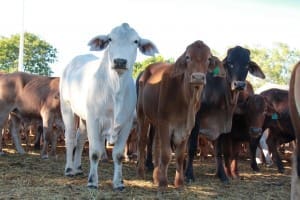Northern export prices are nudging back toward record levels as cattle supplies run scarce ahead of the first mustering round of the season, likely to still be a month away.
Contracts are being written for feeder steers to Indonesia at $3.60-$3.65 ex-Darwin, according to trade sources, with suggestions offers may even be a shade higher for large, high quality lines of export cattle.
Paul McCormick from Elders Katherine said cattle supplies from flood plains have now largely been exhausted.
The Northern Territory has experienced a largely poor wet season to date, but some rain is being received in areas this week which is proving just enough to slow movements of cattle down.
Cattle availability in northern Queensland has also been tempered by recent rains.
For now, there are there not many cattle around until the mustering season starts, Mr McCormick says.
When that occurs will depend on whether forecast lows or potential cyclones come through in the next month.
Northern producers will be heartily cheering on more rain to generate some late grass growth before the dry season.
At this stage most stations are gearing up for a traditional late March, early April start to their first round musters, Mr McCormick said, with some possibly earlier.
The price rise in the past month has taken prices to within sight of the record $3.70-$3.80 range paid for live export steers in Darwin in the 2016-17 wet season.
Northern live export prices are typically at their highest at this time of year when supply is at its lowest point, before first dry season mustering deliver a rush of new supply and prices ease accordingly.
With a month to go before new season numbers start flowing price levels could test the record heights set three years ago.
However the market is also encountering some pushback from the customer end, with feedback from exporters Beef Central spoke with today suggesting early indications of resistance are being seen from Indonesian importers, who are dealing with oversupply due to the large numbers imported from dry northern Australia in the past quarter and competition from Indian Buffalo Meat and Brazillian boxed beef.

